| SHADOWS ON THE WALL | REVIEWS | NEWS | FESTIVAL | AWARDS | Q&A | ABOUT | TALKBACK | |||||
 Shadows off the beaten path Shadows off the beaten pathIndies, foreign, docs and shorts...
On this page:
GETTING AWAY WITH MURDER(S) |
THE LEGEND OF TAYOS |
MISHA AND THE WOLVES
| |||||
| See also: SHADOWS FILM FESTIVAL | Last update 29.Sep.21 | |||||
|
Getting Away With Murder(s) Review by Rich Cline |  MUST
MUST  SEE SEE
| |||||
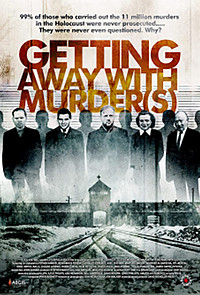 dir-prd David Wilkinson scr David Wilkinson, Emlyn Price with David Wilkinson, Benjamin Ferencz, Stephen Ankier, Kitty Hart-Moxon, Arek Hersh, Malka Levine, Mary Fulbrook , Jens Rommel, Robin Lustig, Dan Plesch, Philip Rubenstein, Axel Fischer voices Eileen Atkins, Julian Glover release UK 1.Oct.21 21/UK Guerilla 2h55 Now streaming... |
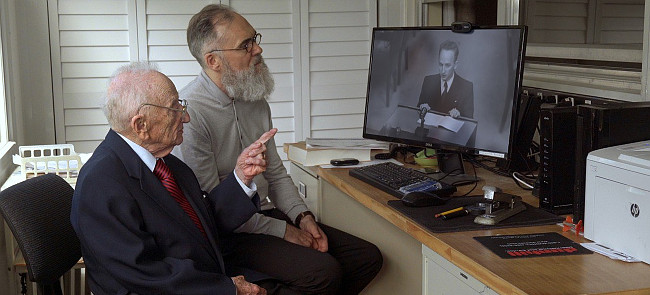 Released on the 75th anniversary of the Nuremberg Trial sentencing, this documentary asks why only 1 percent of the murderers who carried out the Holocaust were ever prosecuted. Taking a journalistic approach on an expansive scale, filmmaker David Wilkinson includes a staggering level of detail both about horrific atrocities and how the perpetrators got away with them. It's an essential, remarkably fresh and important angle on a familiar historical event. Some 720,000 Nazi officers and collaborators were involved in systematic murders during the war, but only a tiny fraction were tried for their war crimes. So Wilkinson visits Auschwitz, where 1.1 million civilians were killed, to ask questions. He also travels the world to speak with experts and gives survivors who were there at the time, like Nuremberg prosecutor Benjamin Ferencz, the chance to vividly tell their stories. The reason why so few were prosecuted for their crimes is complicated and elusive. But Wilkinson uncovers evidence of indifference, racism, incompetence and, shockingly, government penny-pinching. The film cuts between sharply well-shot footage of Wilkinson walking through Auschwitz and first-hand accounts, authoritative research and some deeply unsettling historical footage. Thankfully, the film's tone is never grim, maintaining positive curiosity and a desire to get to the truth. Punctuating the film are case studies about Nazi leaders who escaped from Germany after the war, many of whom never faced justice. The quantity of material is astonishing, sometimes overwhelmingly so, and watching the film feels like binging a documentary series. With such a comprehensive approach, Wilkinson is able to contextualise the Holocaust in a number of inventive ways, including tracing Britain's own history of expelling and murdering Jews, as well as genocides in other countries. And it's an unnerving fact that thousands of cold-blooded mass killers freely lived for decades in their German hometowns, while others hid in plain sight in the US, UK and South America. Quite simply, justice for millions of brutally murdered innocent people wasn't a priority. While this kind of a movie may seem difficult to watch, Wilkinson keeps everything clear-eyed and open-handed, offering a riveting broad picture unlike anything we've seen before. It's packed with heart-stopping details that continually remind us of that real human beings were both perpetrators and victims. And a tour of Berlin later on explores monuments to the various groups that were targeted for extermination. So while all of this is deeply disturbing, the film's aim is to set the record straight rather than stirring up emotions.
| ||||
|
The Legend of Tayos La Leyenda de Tayos Review by Rich Cline | 
| |||||
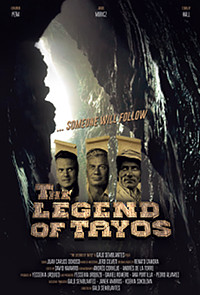 dir-scr Galo Semblantes prd Galo Semblantes, Yessenia Urquizo, Janek Ambros with Juan Moricz, Stanley Hall, Erich von Daniken, Gerardo Pena Matheus, Diego Bermejo, Eileen Hall, Javier Stagnaro, Debora Goldstern, Manuel Palacios, Bolivar Lopez Herrmann, Cesar Real Robayo, Luis Hernandez release US 13.Aug.21, Ec 10.Sep.21 21/Ecuador Amazon 1h26 Now streaming...
| 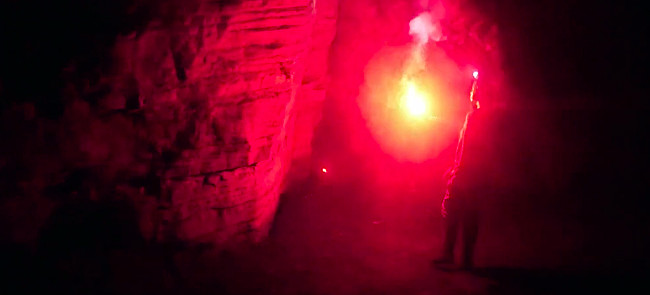 Combining archival footage with beautifully shot new scenes, this documentary traces an outrageous true story that's fascinating in what it says about humanity. It's a very dense film, talky and packed with so much information that it's not easy to keep up with it. The quantity of details is overwhelming for such a brisk film, and a clearer narrative would have made this amazing story more engaging and even thrilling. In 1969 Guayaquil, stories started circulating about Hungarian-Argentine explorer Juan Moricz's wild claim that he had discovered the origins of humanity in caves on the edge of Ecuador's Amazon rainforest. Named after the tayos birds that live there, the cave system is protected by local Shuar tradition. An anthropology professor, Moricz was fascinated by linguistic connections between Hungarian and Ecuadorian dialects, plus a link to the Mormons. But even though his stories made him sound like a fantasist or scammer, the government funded Moricz's first expedition to prove the existence of a huge subterranean civilisation. The film opens with a note about how romance is stronger than reality, which helps explain how so many people have been swept up in Moricz's grand quest, echoing the centuries-long search for El Dorado, which is also thought to be in Ecuador. Director Semblantes assembles the film from extensive period footage and interviews, cleverly animated snapshots, and a variety of present-day interviews that narrate the story. These include several people who were present on expeditions, as well as experts who have investigated and written about them. It's fascinating to see Swiss author Erich von Daniken speak about hearing of Moricz's exploits and travelling to Ecuador to get involved. He wrote the 1973 book The Gold of the Gods as a result, claiming that Moricz's discoveries proved that extraterrestrials were part of ancient human history. Although he later admitted that he never visited the caves. Less controversial is Scottish author Stanley Hall's approach to Moricz's work, accompanying him on a 1976 expedition into the caves alongside Neil Armstrong. And his daughter Eileen has carried the torch more recently, as it were. Over the course of the film, the story twists and twists again, as people step forward with more information and key figures pass on, taking secrets with them. Through all of this, the caves remain shrouded in mystery, fiercely protected by the local community. The documentary concludes with some stunning recent footage of an expedition into the cave system, even as the understanding is that the legendary treasure is somewhere else, undiscovered.
| | |||
|
Misha and the Wolves
Review by Rich Cline | 
| |||||
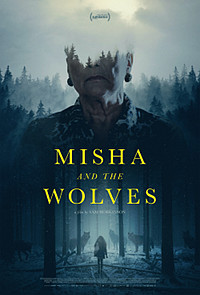 dir-scr Sam Hobkinson prd Jurgen Buedts, Poppy Dixon, Al Morrow, Matt Wells, Gregory Zalcman with Misha Defonseca, Jane Daniel, Evelyne Haendel, Sharon Sergeant, Marc Metdepenningen, Ramona Hamblin, Joni Soffron, Karen Schulman, Jean-Philippe Tondeur, Pat Cunningham, Marie-Claire Mommer release US 11.Aug.21, UK 3.Sep.21 21/Belgium 1h30 SUNDANCE FILM FEST  Now streaming... |
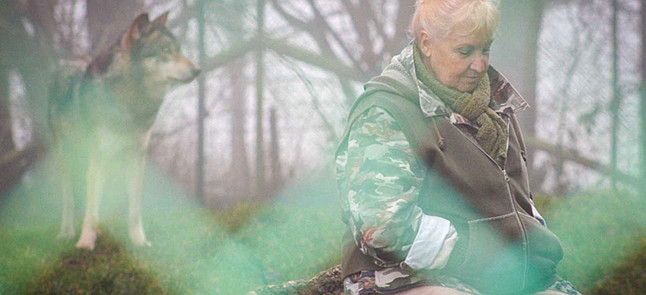 This may be a documentary, but it has more outrageous twists than most mystery thrillers. Filmmaker Sam Hobkinson tells the story with range of inventive techniques, including firsthand interviews, archival photos and clips, dramatic recreations, animation and some movie-style trickery. And the people interviewed on-screen have a wonderfully earthy charm. What emerges is a riveting exploration of the power of storytelling itself, especially when sympathy is brought into play. In small-town Massachusetts, neighbours are shocked when Misha recounts her story, about how her Jewish parents were captured by the Nazis when she was 7, and she was hidden with a Catholic family in Brussels. Looking for her parents, she tried to walk to Germany. Sticking to the woods to avoid violence, she was taken in by a pack of wolves who helped her survive. After a publisher prints her biography, things begin taking some odd turns, leading to a lawsuit and a tenacious investigation to discover whether or not Misha's story is true. Doubting the account of a Holocaust survivor is unthinkable, and yet this film provocatively takes on the idea, digging for truth in a way that feels transgressive but vital. Interviews with the key players are fascinating, mainly because these people are so down-to-earth about their role in this saga. And the recreations beautifully echo the fairy tale aspects of the narrative, as well as animated courtroom-style sketches. So by the time things begin to shift, we're fully gripped by Misha's tale. The film is slickly assembled to create a driving narrative, gaining interest as so many normal people are caught in the gravitational pull of Misha's astonishing story. And while the unfolding events are laced with secrets, Hobkinson's cheeky filmmaking also has some confessions to make along the way, leading to a particularly ingenious reveal about one of the key interviewees. The approach smartly puts our own perceptions right in the crosshairs. As one person observes, most of the trouble here can be traced to greed, even if it isn't acknowledged as such. In wanting Misha's story to be true and to get it out to the widest audience possible, many people are complicit in a deception that's very difficult to define, simply because there's a powerful human element at work here that never allows Misha to become a villain. This is a punchy film that challenges the way we approach history and the deeper meaning of fascinating stories we hear about other peoples' lives.
| ||||

See also: SHADOWS FILM FESTIVAL © 2021 by Rich Cline, Shadows
on the Wall
HOME | REVIEWS | NEWS | FESTIVAL | AWARDS
| Q&A | ABOUT | TALKBACK | | ||||


